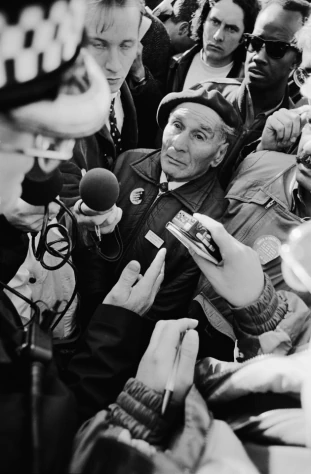Thomas R Ullmann
 Courtesy of Nick Ullmann. Leon Greenman outside a London courthouse in
1993 during an anti-fascist demonstration calling for the closure of the
British National Party headquarters
Courtesy of Nick Ullmann. Leon Greenman outside a London courthouse in
1993 during an anti-fascist demonstration calling for the closure of the
British National Party headquarters
One of the many good fortunes of my childhood was the contact I had with my parents’ acquaintances, who tended to be both inquisitive and inspiring by nature. My father, a teacher by profession, had been involved in the anti-racism movement from my earliest years and had become acquainted with Leon through such channels. By this point, Leon was utterly dedicated to sharing his experience of utmost tragedy-one that many sought to forget-and as such, he devoutly visited schools to speak. My father’s school was but one of many.
Visiting Leon’s home is a poignant childhood memory. His office was a treasure trove of visual stimuli, wonderfully cluttered with books and papers. It was the room I remember most distinctly from his apartment during our visit, clearly the space in which he spent much of his time. What I failed to recognise at the time were the bars fitted to his windows, an eerie reminder of the death threats and vandalism committed against his home by the far right, who had already thrown bricks through his windows. Alas, the hatred of the "other" continued, and continues to live on.
As we sat by his desk, I remember his gentle smile and warm demeanour toward me. Interestingly, this was a characteristic of Leon that many remember. It made the contrast all the starker when recollection began-like the darkest storm cloud on a warm summer’s day, intensely vivid.
Leon would often begin recalling his memories by highlighting the tattoo, the branding of the number scarred into his arm in Auschwitz. He refused to have it removed, as many had done. It was the harsh evidence he chose to carry with him, a burden he was willing to bear.
Despite being of British nationality, the draw of love had brought Leon to Rotterdam, where in 1940 he lived with his wife Esther and their newly born son, Barney. That same year, the Nazi invasion quickly reduced the British consulate to ruin, ridding Leon of his documents and the chance for him and his family to be evacuated.
The noose of fascism tightens in increments, so as to be excused. This was no different under the Nazis. As such, and despite the war, Leon initially continued to be active as a salesman, while the Nazis implemented their derogatory, dehumanising laws-one by one. He would later regret not going into hiding and had underestimated the difficulty of returning to Britain as an undocumented migrant until it was too late.
The deportations began at the end of 1942, with Leon and his family eventually arriving in Auschwitz in the midst of winter, crammed into cattle wagons. This was his final moment with his beloved wife Esther and son Barney, who were murdered in the camp. As the family was torn apart, the Nazi guards laughed.
Leon would recall the memories that haunted him the most. The veil of denial was lifted regarding Barney’s fate when he saw the pile of children’s shoes-this was the moment the horror of the camp, the industrialised murder, became fully apparent. Other memories included the perpetual stench from the crematoria, the vindictive beatings, and omnipresent fear.
What makes Leon’s story so enduring isn’t only what he endured, but how he responded. Whilst caged, expecting death in the depths of this pinnacle of brutality, Leon prayed. He vowed that, if he survived, he would not stay silent, but inform and teach of the terrors that were imposed on so many. The abject suffering.
In the aftermath of the war, Leon returned to England, moved to East London, and became a bookseller (His love for books was confirmed by the colossal book collection in his home). Alas, despite his vow, Leon remained relatively silent until the late 1970s. That decade saw the rise of the neo-Nazi movement in the UK-violent thuggery with a penchant for white nationalism and Holocaust denial. Leon could remain silent no longer.
What Leon then became is the Leon that inspired me. Leon was driven to inform, speaking at many venues a week–schools, community centres, universities. He spoke in detail, vivid memories, with absolute clarity. Leon published his memoir, titled An Englishman in Auschwitz, in 2001, an act that ensured his testimony would endure not only through spoken word but in the permanence of the written page, a lasting record of truth against the erosion of memory and denial.
Despite various death threats from the far right, Leon stood firm, becoming all the more driven. As an elderly man, hip replacements and ill health did not hinder his zeal. Leon remained actively engaged in Holocaust education and anti-fascist advocacy until shortly before his passing in 2008.
At his funeral, Leon had left a final wish for us to hear, and to paraphrase: do not cry for me, but use that emotion, that energy, to inform.
Young and old alike must learn about the Holocaust as a warning against the dangers of racism.
There is no difference in colour or religion.
If I had survived to betray the dead,
it would have been better not to survive.
We must not forget.
Please do not forget.
—Leon Greenman, quoted in the Holocaust Gallery at the Jewish Museum London, accessed 2024.